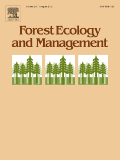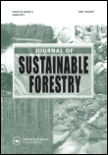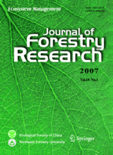
NEW FORESTS
Scope & Guideline
Leading the Charge in Forestry Research.
Introduction
Aims and Scopes
- Forest Ecology and Biodiversity:
Research that investigates the ecological dynamics within forest ecosystems, including species interactions, biodiversity conservation, and the impacts of environmental changes on forest health. - Sustainable Forest Management:
Studies focused on practices that promote sustainable use of forest resources, ensuring ecological integrity while meeting economic and social needs. - Climate Change and Forest Response:
Investigations into how climate change affects forest ecosystems, including species adaptation, carbon sequestration potential, and management strategies to mitigate climate impacts. - Forest Restoration and Rehabilitation:
Research that explores methods for restoring degraded forest ecosystems, including afforestation, reforestation, and the role of native species in ecosystem recovery. - Genetics and Tree Improvement:
Studies on genetic diversity, breeding techniques, and biotechnology applications aimed at enhancing forest species resilience and productivity. - Soil-Plant Interactions:
Research examining the relationships between soil health, nutrient dynamics, and tree growth, particularly in the context of sustainable forestry practices.
Trending and Emerging
- Climate Resilience and Adaptation Strategies:
There is a growing body of research dedicated to understanding how forests can adapt to changing climate conditions, emphasizing species resilience, management practices, and ecosystem services. - Technological Innovations in Forestry:
The integration of advanced technologies such as remote sensing, UAVs, and data analytics in forest monitoring and management is becoming increasingly prevalent, enhancing research capabilities. - Forest Carbon Dynamics and Climate Mitigation:
A surge in studies focused on carbon stock assessments and the role of forests in climate change mitigation highlights the importance of forests in global carbon cycles. - Ecological Restoration and Biodiversity Enhancement:
Research emphasizing the restoration of ecosystems and enhancement of biodiversity through innovative practices is on the rise, reflecting a global commitment to sustainable development. - Soil Health and Nutrient Management:
Emerging interest in the relationship between soil health and tree growth, including studies on nutrient dynamics and soil management practices, is gaining traction.
Declining or Waning
- Traditional Silvicultural Practices:
There is a noticeable decrease in studies focused solely on conventional silviculture. As the field shifts towards more sustainable and innovative approaches, traditional practices are being overshadowed. - Non-native Species Utilization:
Research on the use of non-native tree species for forestry purposes has become less frequent, likely due to increasing awareness of ecological risks and a preference for native species. - Historical Forest Management Techniques:
The focus on historical practices and their applications in modern forestry is waning, as contemporary approaches and technologies take precedence.
Similar Journals

FOREST ECOLOGY AND MANAGEMENT
Championing Interdisciplinary Collaboration in ForestryFOREST ECOLOGY AND MANAGEMENT is a premier peer-reviewed journal dedicated to the integral study of forest ecosystems and their management, published by Elsevier in the Netherlands. With an impactful presence in the field, this journal boasts a prestigious Q1 ranking in multiple categories, including Forestry, Management, Monitoring, Policy and Law, and Nature and Landscape Conservation as of 2023. It addresses key issues relevant to sustainable forest practices, conservation strategies, and environmental monitoring, making it a vital resource for researchers, practitioners, and policymakers alike. The journal is indexed with an impressive Scopus rank, placing it among the top tier of titles in Agricultural and Biological Sciences and Environmental Science. While it does not offer Open Access options, its rigorous review process and high visibility make it essential for those seeking to stay abreast of the latest findings and trends in forest ecology and management. Published continuously since 1976, FOREST ECOLOGY AND MANAGEMENT aims to foster interdisciplinary collaboration and advance knowledge critical to the stewardship of forest resources in an ever-changing global landscape.

EUROPEAN JOURNAL OF FOREST RESEARCH
Unveiling Insights for Climate-Resilient ForestsThe European Journal of Forest Research (ISSN: 1612-4669; E-ISSN: 1612-4677), published by Springer, stands at the forefront of advancing the field of forestry and plant sciences. With a distinguished reputation reflected in its Q1 category rankings in both Forestry and Plant Science for 2023, this journal excels in disseminating high-quality research that addresses the critical challenges facing forest ecosystems across Europe and beyond. Established in Germany, the journal has transitioned through various phases since its inception in 1996, striving to integrate innovative research findings that promote sustainable forest management and conservation strategies. As part of a rich academic tradition, it boasts a commendable ranking within the Scopus database, placing it in the top echelons of its category. Researchers and practitioners alike can benefit from its commitment to open access options, ensuring that cutting-edge studies are accessible to a global audience. The European Journal of Forest Research serves as an essential platform for knowledge exchange, aiming to enhance the understanding of forest dynamics and improve the management of forest resources in the face of a changing climate.

CANADIAN JOURNAL OF FOREST RESEARCH
Pioneering research for a greener tomorrow.Canadian Journal of Forest Research (ISSN: 0045-5067, E-ISSN: 1208-6037), published by Canadian Science Publishing, stands as a leading platform for disseminating cutting-edge research in the field of forestry and ecological sciences. With an impressive impact factor and a steady reputation for high-quality publications, this journal occupies a prestigious position indicated by its Q1 ranking in Forestry and Q2 in Ecology as of 2023, alongside commendable placements in global and planetary change studies. Covering a broad scope from sustainable forest management to the impacts of climate change on forest ecosystems, the journal encourages submissions that address contemporary challenges and innovations in forest research. Operating from its base in Ottawa, Canada, the Canadian Journal of Forest Research has been a cornerstone of academic discourse since 1974, offering researchers and professionals vital access to pioneering studies that inform policy and practice in forestry. Researchers, educators, and students alike will find this journal an indispensable resource for advancing knowledge and fostering collaboration in the vital realm of forest research.

Journal of Sustainable Forestry
Innovating forestry research for a resilient planet.Journal of Sustainable Forestry is a premier academic publication dedicated to advancing knowledge and practices in the field of sustainable forestry and environmental management. Published by Taylor & Francis Inc in the United Kingdom, this journal has been a cornerstone for researchers and professionals since its inception in 1992. With an impressive reputation, it boasts a 2023 Q2 ranking in Food Science, Forestry, and Geography, Planning and Development, highlighting its significant contribution to interrelated disciplines. The journal’s impact is further underscored by its Scopus ranking, especially in Forestry where it holds the 43rd position out of 174 publications, placing it in the 75th percentile. Although not open access, the journal remains committed to providing innovative research and practical insights into forest management, ecological sustainability, and policy development. As the field of sustainable forestry continues to evolve, the Journal of Sustainable Forestry serves as an essential resource for those committed to advancing sustainable practices globally, fostering a deeper understanding of how sustainable forestry can contribute to environmental resilience and biodiversity conservation.

FOREST SCIENCE
Exploring innovative solutions for ecological challenges.FOREST SCIENCE, published by Oxford University Press Inc, is a pivotal journal in the field of forestry and ecological modeling, boasting an impressive track record since its inception in 1970. With an ISSN of 0015-749X and E-ISSN 1938-3738, the journal provides a valuable platform for the dissemination of high-quality research and studies that address contemporary challenges in forestry and ecology. It ranks in the Q2 category for both ecology and forestry and holds a Q3 ranking in ecological modeling according to the latest evaluations, illustrating its significant contribution to these fields. The journal is accessible through various options, facilitating broad readership and engagement within the academic community. As part of its commitment to advancing knowledge and practices in forest management and conservation, FOREST SCIENCE seeks to bridge theoretical research with practical applications, making it an indispensable resource for researchers, professionals, and students alike.

JOURNAL OF FORESTRY RESEARCH
Elevating forestry studies to new heights of excellence.JOURNAL OF FORESTRY RESEARCH, published by Northeast Forestry University in China, stands as a pivotal platform for advancing the field of forestry science. With an ISSN of 1007-662X and an E-ISSN of 1993-0607, this esteemed journal has maintained its commitment to disseminating high-quality research since its inception in 1997, converging into a recognized authority through the years. Currently boasting a Q1 ranking in the Forestry category for 2023, it ranks 18th out of 174 journals in its field on Scopus, highlighting its vital role in shaping contemporary forestry studies. The journal focuses on a broad spectrum of topics pertinent to forestry, including sustainable forest management, ecology, and conservation efforts, making it an indispensable resource for researchers, professionals, and students alike. Although it is not an open-access publication, the insights shared within its pages promise to contribute significantly to the advancement of knowledge and practices in forestry. The journal's significant impact and relevance are underscored by its operations from Harbin, People's Republic of China, where it continues to foster scholarly communication in the world of forestry research.

Sylwan
Connecting science and practice in sustainable forest management.Sylwan, published by POLSKIE TOWARZYSTWO LESNE, is a key journal in the field of forestry, focusing on the science and practice of sustainable forest management and conservation. Operating since 1979 and releasing issues periodically, including those from 2011 to 2018 and from 2020 to 2024, this journal plays a vital role in disseminating research and advances in forestry practices particularly relevant to Poland and the broader European context. While currently not offering open access options, Sylwan maintains a Q4 ranking in the forestry category according to the Scopus database, highlighting its dedicated niche within the scientific community. The journal serves as an essential resource for researchers, professionals, and students seeking to enhance their understanding of forestry issues in a global and ecological framework. With a commitment to promoting innovative research, Sylwan supports the ongoing dialogue on forestry management and policies, ultimately contributing to the sustainable development of forest resources.

JOURNAL OF TROPICAL FOREST SCIENCE
Cultivating Insights for Tropical Forest SustainabilityThe JOURNAL OF TROPICAL FOREST SCIENCE, published by the FOREST RESEARCH INST MALAYSIA, serves as a vital platform for disseminating research focused on tropical forestry. Since its inception in 1988 and transitioning to its current form in 1993, this journal has established itself within the academic community, currently holding a commendable Q3 ranking in the Forestry category, as per the 2023 metrics. With an ISSN of 0128-1283 and E-ISSN 2521-9847, it provides crucial insights into the ecological, economic, and social aspects of tropical forest management and conservation, making it an indispensable resource for researchers, practitioners, and students alike. Although it does not operate under an open-access model, the journal emphasizes quality and relevance in its publications, contributing significantly to the ongoing discourse in agricultural and biological sciences with a Scopus rank of #89 out of 174 and a 49th percentile position.

ANNALS OF FOREST SCIENCE
Transforming Understanding of Forest EcosystemsANNALS OF FOREST SCIENCE, published by Springer France, stands at the forefront of ecological research, contributing significantly to both the fields of Ecology and Forestry, as evidenced by its prestigious Q1 ranking in both categories for 2023. Since its inception in 1999, this journal has become an essential resource for academics, practitioners, and students who are eager to explore the complexities of forest ecosystems and their interactions with global environmental changes. With an ISSN of 1286-4560 and E-ISSN 1297-966X, it disseminates cutting-edge research and critical reviews that enhance our understanding of forest science. Although it does not offer open access, the journal continues to be a pivotal platform for presenting innovative scientific findings that address the pressing challenges of forest management and conservation. Its significant impact factor reflects the high-quality contributions that have made a lasting mark on the discipline.

Austrian Journal of Forest Science
Fostering ecological knowledge for a greener future.Austrian Journal of Forest Science, published by OSTERREICHISCHER AGRARVERLAG, is a distinguished peer-reviewed journal dedicated to advancing knowledge in the fields of forestry and ecological science. With an ISSN of 0379-5292 and an E-ISSN of 0375-524X, this journal serves as a vital platform for researchers, professionals, and students alike, aiming to disseminate innovative research findings, methodologies, and case studies pertinent to forest conservation, management, and policy. Situated in Austria, its diverse scope encompasses critical topics within ecology, evolution, and biodiversity, evidenced by its competitive quartile rankings in 2023, placing it in Q2 for Forestry and Q3 in other related fields. The journal is committed to fostering a deeper understanding of forest ecosystems, making it an essential resource for anyone invested in sustainable forestry practices and environmental policy.